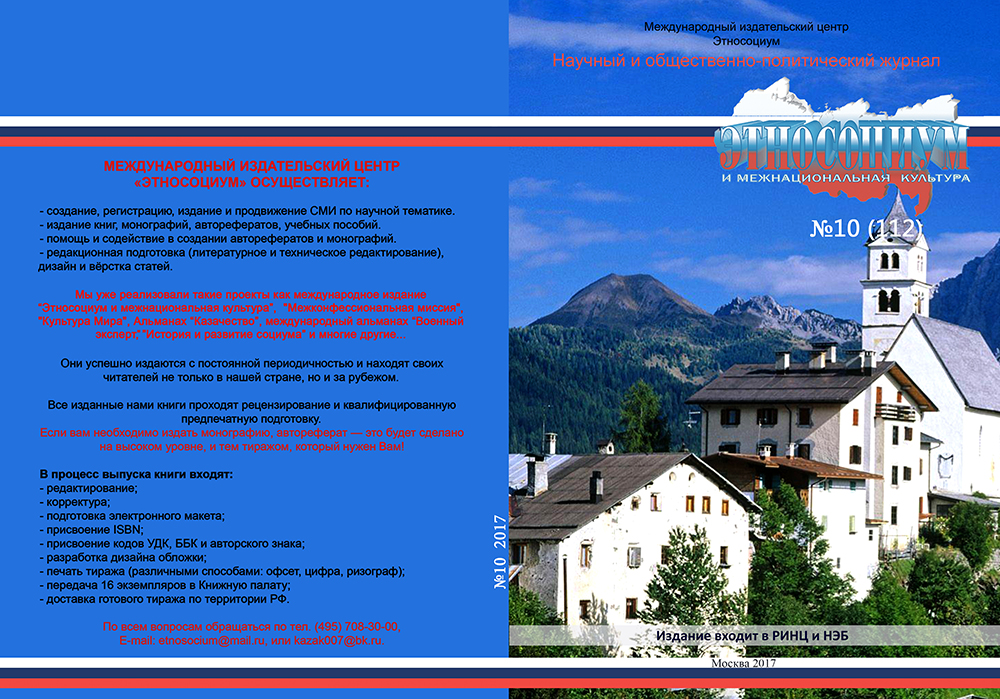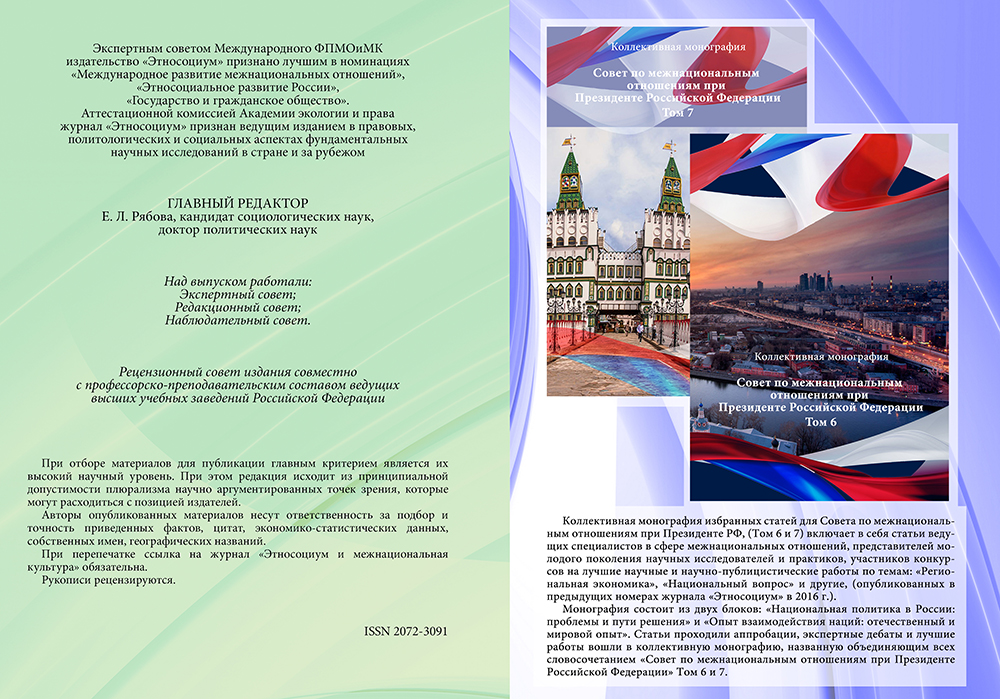

Content
|
COUNCIL OF INTERNATIONAL RELATIONSHIP
|
|
|
Mikhailova N.V., Tolochko A.V., Grishin O.E. Image aspects of the socio-political youth organizations formation in the regional dimension (the example of the Lipetsk region)
|
9
|
|
Sedina E.A., Murashko S.F. Modern Constants оf the State Information Policy
|
19
|
|
POLITICS, ECONOMICS, LAW:
ACTUAL PROBLEMS OF MODERN SOCIETY
|
|
|
Dovgopolov E.J. Institutionalization as a sociological problem and its methodological significance for ethnic policy
|
25
|
|
Osokin A.N. The role of ideology of the Russian intelligentsia in the context of determination of directions of social thought in Russia in the late XIX – early XX century
|
36
|
|
Yudina E.V. The development of key legislation that influenced the structural development of private pension funds
|
44
|
|
Kuntsevich Y.M. Activities of the Military Tribunal of the Leningrad Front to Combat theft and squandering during the Great Patriotic War and the brutal blockade of Leningrad
|
50
|
|
Asryan T.Yu., Enina A.A., Zubalova O.A. Judicial solution as a way of protection of civil rights
|
60
|
|
POLITICS, ECONOMICS, LAW:
REGIONAL STUDY
|
|
|
Shakhov S.K. A single educational space in the light of the reformational changes
|
66
|
|
Melnikova A.Y. Social networks and some feature preculiar to youth online communication
|
82
|
|
INTERNATIONAL RELATIONSHIPS:
POLITICS, ECONOMICS, LAW
|
|
|
Murashko S.F., Dolgenko A.N., Rudakova S.V. Vicissitudes of the language globalization
|
92
|
|
Efremova E.A. Experience of Ethnosocial Integration Processes
|
97
|
|
Belov A.A. Moral imperatives in prohibition moduses: “cultural code” of Iranian cinema as the key to its worldwide popularity
|
108
|
|
Pishik V.I., Gladkiy V.N. Socio-psychological peculiarities of the mentality of generations of Swedes
|
119
|
|
Khasanov E.R. Development of copyright in Azerbaijan
|
128
|
|
Chen Jinling Prospects of China's investment in the Russian oil and gas industry
|
135
|
|
REVIEW
|
|
|
Lopatnikov D.L. Regional Policy
|
140
|
|
Gerasimenko T.I. Regional Policy
|
142
|
|
Abstract
|
144
|
|
Authors
|
153
|
|
Requirements to materials submitted to the international publishing house "Etnosocium"
|
159
|
In the article, through the prism of the concrete region, the experience of involving young people in the activities of socio-political organizations through improving their image mechanisms was explored.
Keywords: youth, youth organizations, civil society, state youth policy, political institutions, social activity, self-organization, image mechanisms.
The article deals with the main permanent categories (constants) that regulate the formation and implementation of the state information policy. Practical implementation of the basic provisions of the state information policy is examined on the example of the Moscow Government.
Keywords: state and society, information policy, public relations.
The research of institutionalization of ethnic politics is impossible without sociological explanations and constructions. A comparative analysis of the concepts of "social institution" and "social organization" is important in this context. The author reveals the methodological importance of institutionalizing of ethnic policy to control this sphere of social relations.
Keywords: institutionalization, sociology, methodology, ethnic politics, political science, social institution, social organization.
The subject of the article is analysis of the function of worldview thinking class in the development of Russia. Considers various points of view on the definition of the term intelligentsia. Emphasizes the historical continuity of the tradition of thinking of the intelligentsia, past and present. Using the methodological approaches of various social Sciences attempts to comprehend the failure of the intelligentsia in the sphere of social thought and action. Analyzed the situation currently in the field of culture and ideology, assessed the role of intellectuals in it. Intended common way out of the present crisis, indicated the primary role of the intelligentsia in this process.
Keywords: intelligentsia, revolution, social, personality, history, politics, phenomenon, utopia, mythology.
In the presented article demonstrates the historical process of the formation of the legislation that led to the development of the private sector pension provision in the Russian Federation. The author thoroughly and consistently studied regulating pension provision, regulatory legal acts adopted in the period from 1996 to 2012 and showed the impact of the entry into force of the aforementioned legal acts for pension systems. The author notes that in the period since its inception, the activities of private pension funds is under strict state control. This ensured a mass participation of the insured in the pension insurance of individuals in the formation of pension savings of private pension funds, ensuring their ongoing development.
Keywords: Accumulation part of pension, investment of pension savings, the management company, the Depositary, the placement of pension reserves, licensing.
Cases of theft and squandering of military property and food on the Leningrad front during the Great Patriotic War. They received great attention from the Military Tribunal of the Leningrad Front in the conditions of the most severe blockade of Leningrad and the shortage of food, fuel and other property.
Keywords: Military tribunal of the Leningrad front; theft. Razbazarivanie, the sentence.
In modern conditions of the formation of the rule of law the highest value is recognized by a person, his rights and freedoms. It is the rule of law that can guarantee the protection of human rights and freedoms. The legislation of the Russian Federation regulates the ways of protecting civil rights. The judiciary in the protection of civil rights by courts is carried out through civil proceedings, which is a special procedural form of the court. The content of this form is determined by the law activities of the courts to protect the law, to establish factual circumstances, the application of the law, to determine how to protect the right, to issue a court decision and the features of its publication as a way of protecting civil rights.
Keywords: civil rights, ways of protection of civil rights, disputes.
Communication of young people in the virtual reality of social networks leads to the streaming in them the specific cultural codes. In the analysis of Internet slang the youth discovered a conflict of meanings, due to its identification as a special social group.
Keywords: virtual reality, social group, youth culture, network slang, social network, conflict of meanings, online communication.
This article is devoted to the main points of the historical, geopolitical context that influenced the penetration of the English language into other languages, the formation and development of the English language as a global language of modern intercultural communication. Special attention is paid to the dialogue of cultures and linguistic and cultural development in linguistic globalization.
Keywords: language globalization, vicissitudes of language globalization, dialogue of cultures, linguocultural development, intercultural communication, linguicide, linguoculture.
The article analyses the rise of Iranian cinema to global prominence. The author covers various aspects of the subject, including its unique poetic language, the influence of censorship, and the links to the twentieth century philosophy, in particular Martin Heidegger’s views on technology, which were popular among Iranian filmmakers.
Another aspect reflected in the article is the set of features which are characteristic of Iranian society and which have strongly affected the evolution of the nation’s filmmaking: the tradition of Tazieh drama theatre, the martyrdom cult of Shiism, and the dynamics between the mass and high culture in the country.
Keywords: Iranian cinema, Shia society, censorship, poetic cinema style, 20th century philosophy, Martin Heidegger, postmodernism.
The article presents the results of a comparative empirical research of the Swedes and Russians, representatives of generations X and Y. Analyzed empirical and descriptive work on the description of Swedish identity, the traits of the national character, of national stereotypes, elements, and parameters of national culture. We concluded that the low representation of studies of generations of Swedes. A sample of 50 people, employees and students of educational institutions of Sweden compared with the Russian sample of 50 people. Used methods - cultural-value differential; the technique is the belief in the conspiracy; the method of measurement types of mentality; method of "Communication Styles"; the technique of definition of modal stereotypes of normative attitudes of social behavior. By interviewing the Swedish generations X and Y revealed the events of the country's history that influenced their formation. They are combined with the features of the Swedish nature. We concluded that the severity of the Swedish innovation group mentality and individualism in values, belief in a government conspiracy combined with the credibility of the government. They found significant differences in the Swedish generations in terms of traditions, communication style.
Keywords: swedish identity, generation X, Y, value differential, mentality, communication style, belief in conspiracies.
In the article the author considers problematic questions of copyright in Azerbaijan. It is pointed on modern system of national legislation in this sphere. It is discovered classification of copyright sources. Also it is shown the system of state organs, which are authorized to regulate legal relations in the copyright sphere in Azerbaijan. Particular attention is paid to the State Agency for copyright of Azerbaijani Republic as a central body of this field. Then author discusses perspective projects of Azerbaijan concerning copyright protection by means of on-line mode.
Keywords: Reinforcement IP program, intellectual property, the Internet, plagiarism, copyright, World Intellectual Property Organization Internet network.
Relations between Russia and China have been developing dynamically in recent years. It can be said with confidence that the expansion of mutual understanding between the two countries has become an important part of the whole complex of their bilateral interaction. This article analyzes China's investment strategy and prospects for China's investment in the Russian oil and gas industry.
Keywords: prospects, cooperation, China, investment.